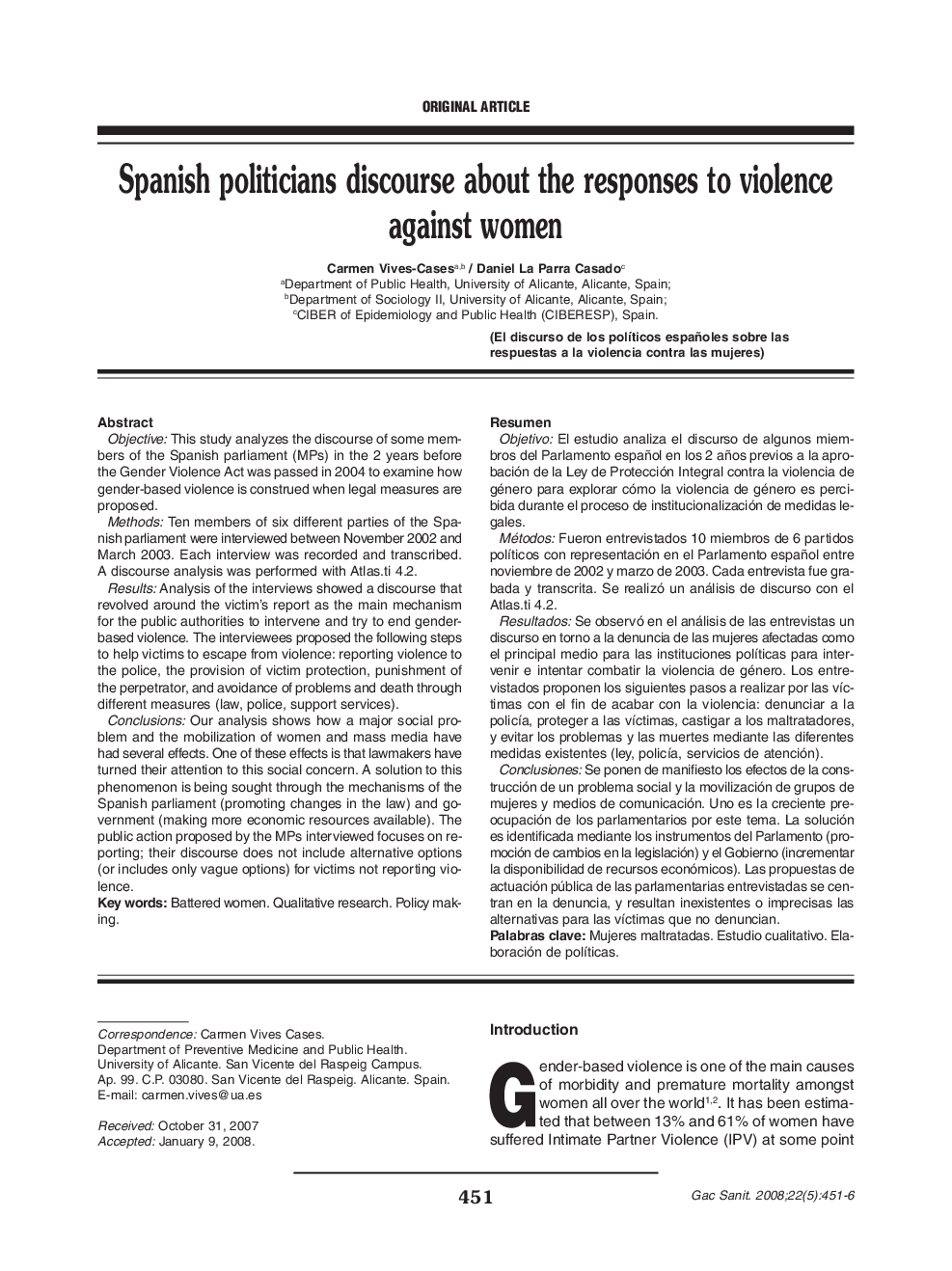| کد مقاله | کد نشریه | سال انتشار | مقاله انگلیسی | نسخه تمام متن |
|---|---|---|---|---|
| 1074147 | 949815 | 2008 | 6 صفحه PDF | دانلود رایگان |

ObjectiveThis study analyzes the discourse of some members of the Spanish parliament (MPs) in the 2 years before the Gender Violence Act was passed in 2004 to examine how gender-based violence is construed when legal measures are proposed.MethodsTen members of six different parties of the Spanish parliament were interviewed between November 2002 and March 2003. Each interview was recorded and transcribed. A discourse analysis was performed with Atlas.ti 4.2.ResultsAnalysis of the interviews showed a discourse that revolved around the victim’s report as the main mechanism for the public authorities to intervene and try to end genderbased violence. The interviewees proposed the following steps to help victims to escape from violence: reporting violence to the police, the provision of victim protection, punishment of the perpetrator, and avoidance of problems and death through different measures (law, police, support services)ConclusionsOur analysis shows how a major social problem and the mobilization of women and mass media have had several effects. One of these effects is that lawmakers have turned their attention to this social concern. A solution to this phenomenon is being sought through the mechanisms of the Spanish parliament (promoting changes in the law) and government (making more economic resources available). The public action proposed by the MPs interviewed focuses on reporting; their discourse does not include alternative options (or includes only vague options) for victims not reporting violence.
ResumenObjetivoEl estudio analiza el discurso de algunos miembros del Parlamento español en los 2 años previos a la aprobación de la Ley de Protección Integral contra la violencia de género para explorar cómo la violencia de género es percibida durante el proceso de institucionalización de medidas legales.MétodosFueron entrevistados 10 miembros de 6 partidos políticos con representación en el Parlamento español entre noviembre de 2002 y marzo de 2003. Cada entrevista fue grabada y transcrita. Se realizó un análisis de discurso con el Atlas.ti 4.2.ResultadosSe observó en el análisis de las entrevistas un discurso en torno a la denuncia de las mujeres afectadas como el principal medio para las instituciones políticas para intervener e intentar combatir la violencia de género. Los entrevistados proponen los siguientes pasos a realizar por las víctimas con el fin de acabar con la violencia: denunciar a la policía, proteger a las víctimas, castigar a los maltratadores, y evitar los problemas y las muertes mediante las diferentes medidas existentes (ley, policía, servicios de atención).ConclusionesSe ponen de manifiesto los efectos de la construcción de un problema social y la movilización de grupos de mujeres y medios de comunicación. Uno es la creciente preocupación de los parlamentarios por este tema. La solución es identificada mediante los instrumentos del Parlamento (promoción de cambios en la legislación) y el Gobierno (incrementar la disponibilidad de recursos económicos). Las propuestas de actuación pública de las parlamentarias entrevistadas se centran en la denuncia, y resultan inexistentes o imprecisas las alternativas para las víctimas que no denuncian.
Journal: Gaceta Sanitaria - Volume 22, Issue 5, September 2008, Pages 451–456